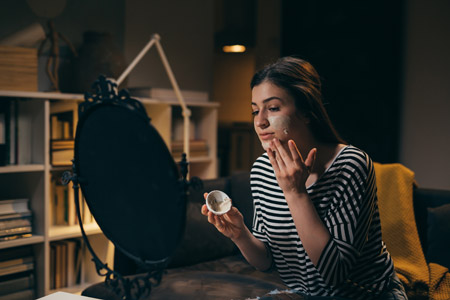


Tips for Living with Eczema
Eczema, also known as atopic dermatitis, is a chronic skin condition that can cause itching, redness, and discomfort.While there is no cure, effective management strategies can help improve your quality of life.
In this article, we’ll explore some practical tips for living with eczema. Always remember to consult with a dermatologist or healthcare professional for personalized advice.
Moisturize Regularly
Keeping your skin hydrated is essential. Use a thick, fragrance-free moisturizer immediately after bathing, when your skin is still damp. Opt for ointments and creams over lotions, as they provide a stronger barrier against moisture loss.
Avoid Triggers
Identify and avoid potential triggers that can lead to flare-ups. Common triggers include certain soaps, detergents, stress, and allergens like dust mites or pet dander. Wear soft, breathable fabrics like cotton and avoid harsh or scratchy materials such as wool.
Bathe Wisely
Keep baths and showers short — about 10 minutes — and use lukewarm water instead of hot. Harsh soaps can dry out your skin, so choose mild, unscented cleansers. Gently pat your skin dry with a soft towel instead of rubbing it.
Manage Stress
Stress is a known eczema trigger. Incorporating relaxation techniques like deep breathing, meditation, or gentle exercise can help manage stress levels. Additionally, maintaining a regular sleep schedule can be beneficial as poor sleep can aggravate symptoms.
Follow Your Treatment Plan
Work closely with your healthcare provider to establish a treatment plan tailored to your needs. This might include topical treatments like corticosteroids or non-steroidal creams, or other therapies. Sticking to your prescribed regimen is vital for controlling flare-ups.
Stay Informed
Education is key. Stay updated on eczema management and emerging treatments. Being informed can empower you to better manage your symptoms and reduce flare-ups.
Eczema can be challenging, but with the right strategies, you can minimize symptoms and improve your skin health. Always consult with a dermatologist for personalized advice.
The information on this site is for informational purposes only and should not replace direct medical advice, diagnosis, or treatment from your doctor or another qualified healthcare provider.
Sources:


.jpg)
.jpg)
.jpg)


















.jpg)





















.jpg)

















.jpg)


























.jpg)
.jpg)
.jpg)









